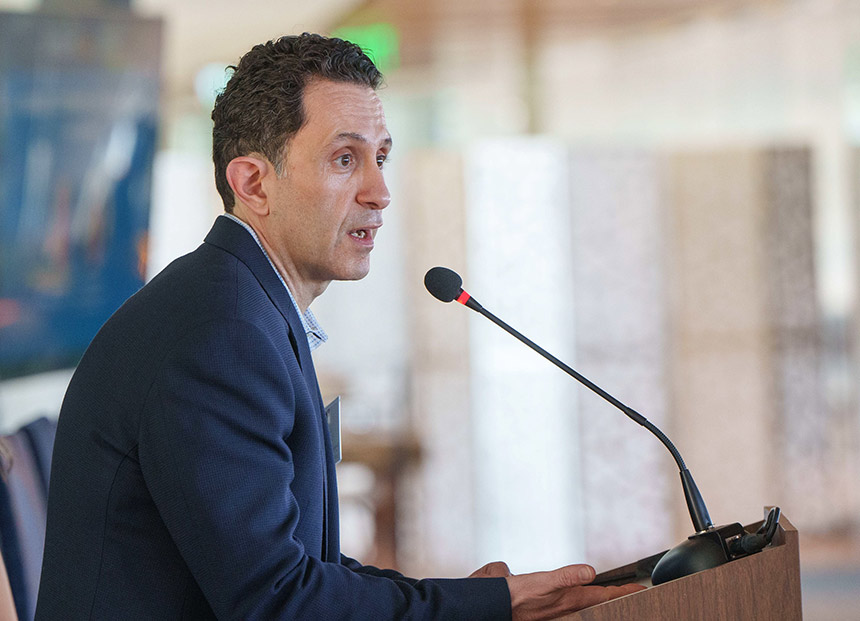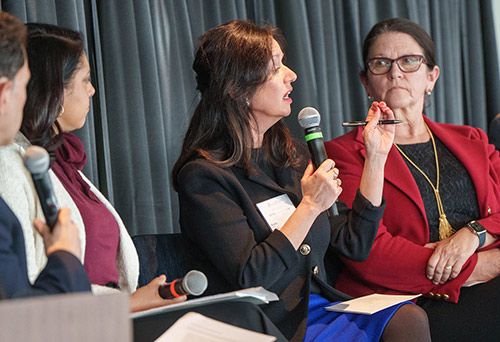
By Andrew Cohen
At the recent inaugural Berkeley Corporate + Climate Summit, experts in business, government, academia, and the nonprofit sector discussed strategies for corporations to propel a more sustainable economy. The very topic itself — how corporate governance can help mitigate climate change — reflects profound changes they’ve seen from boardrooms in recent years.
The law school’s Berkeley Center for Law and Business (BCLB) and Center for Law, Energy & the Environment (CLEE) co-sponsored the unique two-day event with the American Bar Association.

“This is the most exciting time for corporate law in my career because we see this big change in how corporations are responding to climate,” said Berkeley Law Professor Stavros Gadinis. “That’s why we wanted to convene this meeting. While a bunch of new regulations are coming, a change in the depth, size, and intensity required to meaningfully address climate change cannot happen without internal change within companies.”
Panelists explored many ways lawyers can help drive this change, and how in-house counsel are moving the needle. They also highlighted the recent pushback against the ESG (environmental, social, and governance) movement, which urges companies to factor ethical and sustainability considerations into their decisions.
Susan Mac Cormac, who co-chairs Morrison Foerster’s ESG + Sustainability and Social Enterprise + Impact Investing practices, hailed Berkeley Law’s seminal work in corporate governance research and called it a fitting venue for the debut conference.
“This is the first conference about climate on the corporate side at any law school in the country,” said Mac Cormac, who interviewed former Sustainability Accounting Standards Board CEO Janine Guillot. “The fact that Berkeley is taking a leading role is really special and speaks about the institution and the people who work and teach here.”
Noting that “being a long-term investor is a responsibility, not just an advantage, to future generations of both taxpayers and beneficiaries,” Guillot identified corporate behavior and corporate disclosure as two key areas of change. She said that “disclosure influences operations and operations influence disclosure.”
Growing sense of urgency
BCLB Executive Director Angeli Patel ’20, who moderated a panel on climate’s role in ESG, and described how the past three years have seen that topic emerge as the highest ESG priority.
Finding common ground, however, remains challenging. Given the global scope of climate change, speakers expressed concern about regulatory fragmentation, as the Securities and Exchange Commission, European Union, and other regulatory bodies set varying standards.
“There’s data we can track to have a common language and use to hold each other accountable,” said Berkley Rothmeier, director of consumer sectors at BSR. “This is a truly global issue, and the urgency of it should bring people to the table to develop common practices and measuring methods.”

Describing a declining faith in corporations and even science, other speakers echoed Rothmeier’s plea for unifying standards.
“Right now, it’s going to be very expensive to comply so you better get it right,” said attorney Timothy Wilkins, global partner for client sustainability at Freshfields. “The current problem is that compliance for one regulation won’t work for all regulations, which brings a challenge of dividing and conquering. In the last two weeks, five clients asked me if they should comply with a regulation in Germany or if it’s the right time to make changes that would satisfy more regulatory systems.”
Dave Jones, the director of CLEE’s Climate Risk Initiative, unpacked the center’s work in helping to draft two new California laws on greenhouse gas emission reporting that apply to private and public corporations. He explained that the governing structures involved make consensus more easily attainable in Europe than in the U.S.
“Here, we have 50 states and six territories that each have their own insurance regulator,” said Jones, California’s insurance commissioner from 2011 to 2018. “Because of this, there’s less success in passing legislation that regulates external markets.”
Navigating political heat
A panel on the growing politicization of climate change reinforced how polarized the U.S. political landscape has become. The current backlash against ESG in some areas even created a new term — green-hushing — where climate sustainability advocates are increasingly careful about the language they use.

“It worries me that the anti-ESG legislation is defining climate risk as non-financial risk,” said UC Davis Law Professor Amelia Miazad ’02, the founder and former director of Berkeley Law’s Business in Society Institute. “That’s going to seep into how these companies operate internally and we don’t have any time to waste.”
Experts discussed the tricky dance of worrying about overstating a sustainability commitment to some investors and understating it to others, and that trying to placate multiple stakeholders encourages companies to say nothing about climate. They credited global efforts such as Climate Action 100+, an investor-led initiative to ensure the world’s largest corporate greenhouse gas emitters take necessary action on climate change, for providing needed collective action.
“Climate risk demands collaboration and investor alliances like Climate Action 100+ enable collaborative engagement, stewardship, and information sharing,” Miazad said.
As with seemingly everything in the U.S. these days, speakers said the nation’s political landscape seems poised to play a huge role in how businesses and investors approach climate considerations.
“Climate is now a hotbed issue across the country,” Gadinis said. “The politicization of this issue in the U.S. is much stronger than it is in other countries, especially now in an election year.”